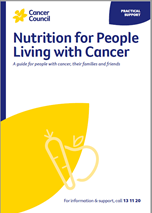- Home
- Stomach cancer
- Managing side effects
- Swallowing difficulties
Swallowing difficulties
You may have difficulty swallowing (dysphagia) before, during or after treatment. This may be caused by the cancer itself or by swelling in the oesophagus after surgery. Signs include: taking longer to chew and swallow; food getting caught in your mouth or throat; or bringing up food or vomiting.
Some people find that food and fluid go into the windpipe instead of the food pipe. This is called aspiration and it can lead to chest infections like pneumonia. Talk to your doctor about these symptoms.
How to eat when it is hard to swallow
- Make food softer by chopping, mashing, slow-cooking, mincing or pureeing food.
- Between meals, snack on soft foods that are higher in energy and protein (e.g. avocado, yoghurt, ice-cream, custard, diced tinned fruit) and drink milkshakes.
- Chew carefully and slowly, sitting still and upright. Try to avoid talking while eating.
- Avoid dry foods such as bread, cakes, muffins and large chunks of meat. Add extra gravy or sauce to your meals.
- Wash food down with small sips of fluid.
- See a speech pathologist for help to manage these symptoms and suggestions on the types of foods to eat and ways to eat and drink safely.
- Talk to your doctor or dietitian if you are losing weight. They can help you find foods that provide enough nutrition and help you maintain your weight.
- Add special nutritional supplement drinks to your diet to help maintain your strength (e.g. Sustagen, Resource and Ensure).
Podcast: Appetite Loss and Nausea
Listen to more episodes from our podcast for people affected by cancer
Dr Spiro Raftopoulos, Gastroenterologist, Sir Charles Gairdner Hospital, WA; Peter Blyth, Consumer; Jeff Bull, Upper Gastrointestinal Cancer Nurse Consultant, Cancer Services, Southern Adelaide Local Health Network, SA; Mick Daws, Consumer; Dr Steven Leibman, Upper Gastrointestinal Surgeon, Royal North Shore Hospital, NSW; Prof Michael Michael, Medical Oncologist, Lower and Upper Gastrointestinal Oncology Service, and Co-Chair Neuroendocrine Unit, Peter MacCallum Cancer Centre, VIC; Dr Andrew Oar, Radiation Oncologist, Icon Cancer Centre, Gold Coast University Hospital, QLD; Rose Rocca, Senior Clinical Dietitian: Upper Gastrointestinal, Nutrition and Speech Pathology Department, Peter MacCallum Cancer Centre, VIC; Letchemi Valautha, Consumer; Lesley Woods, 13 11 20 Consultant, Cancer Council WA.
View the Cancer Council NSW editorial policy.
View all publications or call 13 11 20 for free printed copies.
